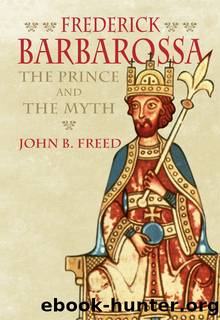Frederick Barbarossa by John Freed

Author:John Freed
Language: eng
Format: epub
ISBN: 9780300122763
Publisher: Yale University Press
Frederick’s Promotion of Economic Development
Frederick was not very interested, seemingly, in economic matters north of the Alps prior to his visit in 1165 to the lower Rhine valley, the most economically developed region in Germany, maybe because he had been until then a largely absentee monarch. As we have already seen, upon his return from Italy in 1155 he had eliminated unauthorized tolls on the Main, except for the imperial toll at Frankfurt and the four pennies that were levied on every new ship at both Neustadt and Aschaffenburg seven days before and after the Assumption of the Virgin (15 August). Merchants traveling upstream either by water or the royal road along the banks were to be free from all charges.27
One other act prior to 1165 had economic implications: Frederick’s confirmation on 6 April 1157 of a lost privilege that his great-grandfather Henry IV had granted around 1090 to the Jews of Worms. It placed all the Jews’ property, real or personal, land or people, which they possessed by hereditary right, under the king’s protection, and granted them the right to trade throughout the realm without paying tolls or any other public or private exaction. They could serve as moneychangers throughout the city of Worms, except in front of the mint and the places where the moneyers exchanged money. The Jews could not own Christian slaves, but could employ Christians as maids and wet-nurses. They could not be compelled to contribute to the king’s or the bishop’s campaigns, nor could anyone be quartered in their homes against their will. The forced baptism of Jewish children was prohibited, but if they converted voluntarily, they would lose their paternal inheritance just as they had relinquished the laws of their fathers. Jews were to be judged by their own laws, even in cases involving Christians. It is hard to tell whether Frederick was merely confirming his great-grandfather’s privilege, even if it had been superseded by other practices, or whether the charter provides an accurate picture of the Jews’ relatively favorable situation in Germany in the mid-twelfth century.28
However, although Frederick declared that the Jews pertained to the imperial chamber, he was merely asserting that all rights of lordship, including the right to protect the Jews and the payments they owed for their defense, were regalian rights. The charter said nothing about the personal legal status of the Jews, that is, whether they were free or servile; and the emperor’s assertion should not be equated with the institution of Jewish chamber serfdom that appears for the first time in a 1236 privilege of Emperor Frederick II.29
Barbarossa, more attune perhaps to the importance of commercial transactions after three stays in Italy, became far more proactive in the autumn of 1165. On 24 September he confirmed the rights of the moneyers of Worms. A consortium of ministerials was in charge of the mint. A new member was required to give half an uncia of gold, that is, 14.61 grams, to the bishop and a gold penny or 60 silver pennies to the master of the mint and the episcopal chamberlain.
Download
This site does not store any files on its server. We only index and link to content provided by other sites. Please contact the content providers to delete copyright contents if any and email us, we'll remove relevant links or contents immediately.
| Military | Political |
| Presidents & Heads of State | Religious |
| Rich & Famous | Royalty |
| Social Activists |
Waking Up in Heaven: A True Story of Brokenness, Heaven, and Life Again by McVea Crystal & Tresniowski Alex(37000)
Empire of the Sikhs by Patwant Singh(22165)
We're Going to Need More Wine by Gabrielle Union(18067)
Hans Sturm: A Soldier's Odyssey on the Eastern Front by Gordon Williamson(16582)
Leonardo da Vinci by Walter Isaacson(11897)
The Radium Girls by Kate Moore(10903)
Educated by Tara Westover(7056)
Tools of Titans by Timothy Ferriss(6937)
How to Be a Bawse: A Guide to Conquering Life by Lilly Singh(6688)
The Last Black Unicorn by Tiffany Haddish(5066)
Permanent Record by Edward Snowden(4987)
The Rise and Fall of Senator Joe McCarthy by James Cross Giblin(4841)
Promise Me, Dad by Joe Biden(4441)
The Wind in My Hair by Masih Alinejad(4421)
The Crown by Robert Lacey(4100)
A Higher Loyalty: Truth, Lies, and Leadership by James Comey(4027)
The Iron Duke by The Iron Duke(3637)
Joan of Arc by Mary Gordon(3254)
How to be Champion: My Autobiography by Sarah Millican(3182)
